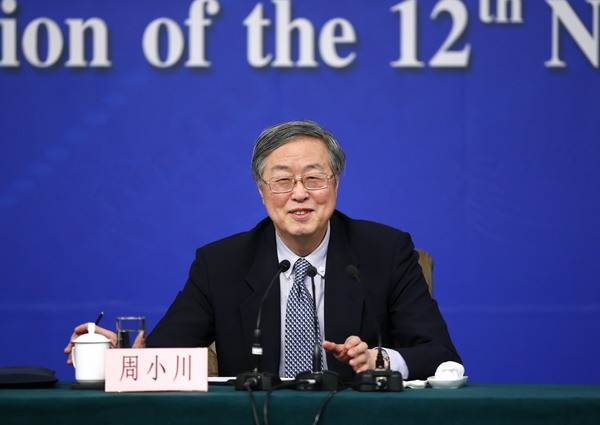PBOC governor says stock market correction roughly in place
Updated: 2015-09-06 13:53
(Xinhua)
|
|||||||||||
 |
|
Zhou Xiaochuan, governor of People's Bank of China, takes questions from journalists at home and abroad during an ongoing press conference on March 12, 2015. [Photo / Xinhua] |
BEIJING -- The recent corrective process in China's stock market has roughly been in place, and a more stable financial market is expected, central bank Governor Zhou Xiaochuan said during the G20 Finance Ministers and Central Bank Governors Meeting in Turkey.
The assuring remarks, released by the People's Bank of China on its website, follow concerns over China's financial stability stoked by the recent round of adjustments.
In the last trading day, the key Shanghai index settled at 3,160.17 points, declining nearly 40 percent from its June peak and wiping out most of this year's gains.
Zhou pointed out that the government had rolled out a string of policies, including central bank liquidity support, to arrest the free fall and have helped prevent systematic risks.
"Market leverage has fallen sharply since the correction, but this has not incurred any notable impact on the real economy," he said, adding that the fluctuations will not change the government's resolve to continue with reform.
Regarding the overhaul of the yuan exchange rate mechanism, which has led to the depreciation of the RMB, Zhou stressed that this was not a sign of things to come, as China's economic fundamentals remained intact and it had a relatively big foreign trade surplus.
The two-day meeting, in Ankara, Turkey, saw G20 finance ministers and central bank governors pledge to take decisive action to keep economic recovery on track.
According to a communique adopted at the end of the meeting, G20 finance ministers and central bank governors will try to avoid persistent exchange rate misalignments and continue to monitor developments, assess spillovers and address emerging risks as needed to foster confidence and financial stability.
Related Stories
China central bank governor says stock market correction roughly in place 2015-09-06 13:20
Securities firms fined for profiteering amid stock market chaos 2015-09-03 09:24
197 punished for spreading rumors about stock market, Tianjin blast 2015-08-31 08:27
Pension funds 'not obliged' to prop up stock market 2015-08-29 07:19
Only real economic growth can calm stock market turmoil 2015-08-27 07:37
Today's Top News
Austria to revoke measures that let migrants cross from Hungary
Ex-VP nominee Palin: Immigrants in US should 'speak American'
China 2014 GDP growth revised down to 7.3%
White paper reaffirms living Buddha policy
Austria, Germany open borders to migrants
PBOC governor says stock market correction roughly in place
'We must learn from the past':UN chief
Social media take parade to the world
Hot Topics
Lunar probe , China growth forecasts, Emission rules get tougher, China seen through 'colored lens', International board,
Editor's Picks

|

|

|

|

|

|






